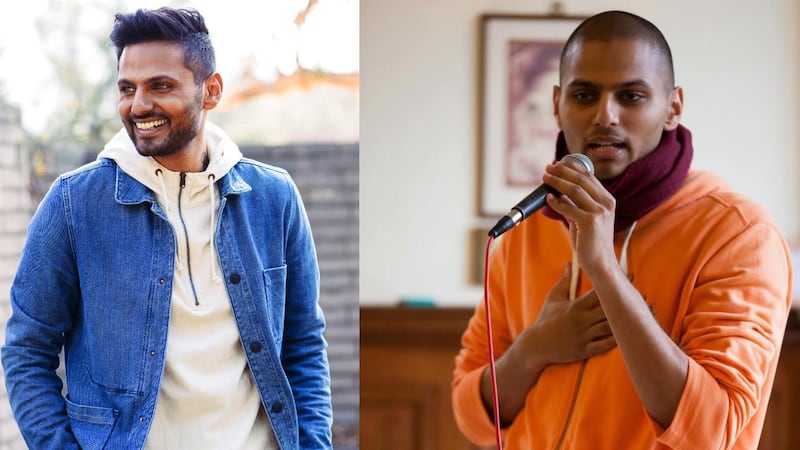"I traded my suit for robes," says Jay Shetty of his decision nine years ago, to leave his home town of London and move to a leafy green area a few hours outside Mumbai to become a Vedic monk, for a while at least. He was 22 at the time.
“I turned down my graduate job offers and decided to go and live as a monk. I shaved my head, slept on the floor, woke up at 4am every day and all of my possessions fitted inside a gym locker,” he says of the monastic life.
His existence couldn't be more different today: he was a monk for three years and now, six years later, he is a bona fide social media influencer and general internet celebrity. I meet Shetty at Facebook's headquarters in the US where he's lauded as one of the platform's more important "creators", with 24 million followers on a page he began just three years ago. He now lives in Los Angeles, and I see that he's ultimately traded in his robes for designer trainers: he's wearing Saint Laurent high-tops when I meet him.
After he moved back to London post-monk-life, Shetty dabbled in corporate motivational speaking, made inspirational videos that went viral and was spotted by mindfulness fan Arianna Huffington. The rest, as they say, is history.
His famous videos fall into the motivational wheelhouse, and give career, relationship and well-being tips, with titles such as "A lonely girl teaches us an important lesson" and "If you work too hard, watch this". They're popular, too, having amassed more than four billion views across different platforms.
Before I speak to Shetty, he gives me and other international media a mini workshop during which he tells us to chew our food more (16 to 32 times), to put healthy food at eye level in our fridge and to spend less time on our phones – specifically in the morning and the evening. He says he bought himself an old-school alarm clock, and at times leaves his phone in the car so that he is forced into a mini digital detox every morning. He encourages us all to avoid being flooded with information via our phones before we've truly woken up.

I ask him how he feels about telling people to spend less time on their smartphones, when he’s someone who creates the very kind of viral content that, in part, keeps us on the device. “Social media is not going away,” he points out, “and we’re not all going to leave our phones for good. But we can make sure we don’t look at our phones in the morning and the evening, which is better for our lifestyle.
“We are so bad at judging and labelling things, and when we do that we stop it from being used for good. So, when we say social media is bad, it’s like: ‘Oh, you can’t do anything good with it.’ But you can do amazing things – you can change lives, you can raise money, you can tell stories.”
I then point out the juxtaposition between the monastic rejection of the material and the very commercial world of influence, of which he’s now an elite member. “One of the things we learnt [as monks] is that anything can be used for a higher purpose,” he responds. “If I had a glass right now, it could be filled with either water or poison. Wealth can be used to make a huge difference in the world; social media can be used to have a positive impact on people, or it can be used for exactly the opposite.”
Shetty is clearly a very busy man: he MCs events, runs coaching programmes, gives free online masterclasses, produces multiple motivational videos a week, is now writing a book and has his own podcast (he's interviewed a diverse range of people, from tennis player Novak Djokovic to comedienne Chelsea Handler and billionaire investor Ray Dalio).
How his Indian parents inspire him
He says that being the children of Indian immigrants informs his work ethic. His mother is from North India but grew up in Yemen, moving to London at 16 in order to keep her UK passport after the end of British rule of the country; she started working in London immediately after she arrived. His father is from Bangalore in the south of India, and moved to the UK when he married his mother. "They put in so much hard work to provide for me and my younger sister, so that we could have opportunities. When I look back on their sacrifice, I see it with so much gratitude, because I think their lives were definitely more challenging than ours today."
His mum's a fan, too: he reveals that she joined Facebook specifically to follow his pages, and will often write something like "Jay, I'm here", during his Facebook Live videos – while she's among the thousands watching them. "My mum's the cutest."
It's not just his mum he interacts with. Shetty tells me he particularly loves to make an "offline connection" with an online fan, and says he's got a particularly passionate legion of admirers in the Philippines, as well as a loyal following in the UAE. "I absolutely love Dubai. I have such a great community of fans out there, who always show me so much love. I came out for the F1 in Abu Dhabi, which was amazing. There's just such a nice reception in the UAE and the hospitality is always incredible."
I see a small queue of Facebook employees forming in the office to meet him while he's there, too – they're from India, America and Australia, and he takes time to meet them all.
Shetty spends much of his day connecting with people around the globe, and talking about deep emotions and fears, so I ask him what the common worries plaguing his Facebook fans are. He tells me there are generally three threads: having work you're deeply passionate about; having someone who you can love and be loved by; and problems surrounding social media and being "lost in external expectation and comparison". Honestly discussing and tackling "the challenges we all spend most of our time thinking about" is what drives him. "For me, it's always about using my platform to give people an alternative narrative, because we all need to upgrade our mindsets."
I probably have an unfair propensity towards cynicism in regard to people who build influence online, but the day before I met Shetty at Facebook, I stood at the elevator at my hotel in Palo Alto (grumpy and jet-lagged, having used my phone far too much that morning already). An elderly lady who seemed to have some trouble walking waited next to me, as did a man I vaguely recognised, one with piercing green eyes. The lift opened, and the man held the door for me and guided the elderly woman into the lift, smiling kindly, then making sure the door was opened for her in the lobby, too.
I didn’t recognise him in the moment, but I realised later that it was Shetty. It seemed to me, in that small moment at least, that he was practising what he preaches.







